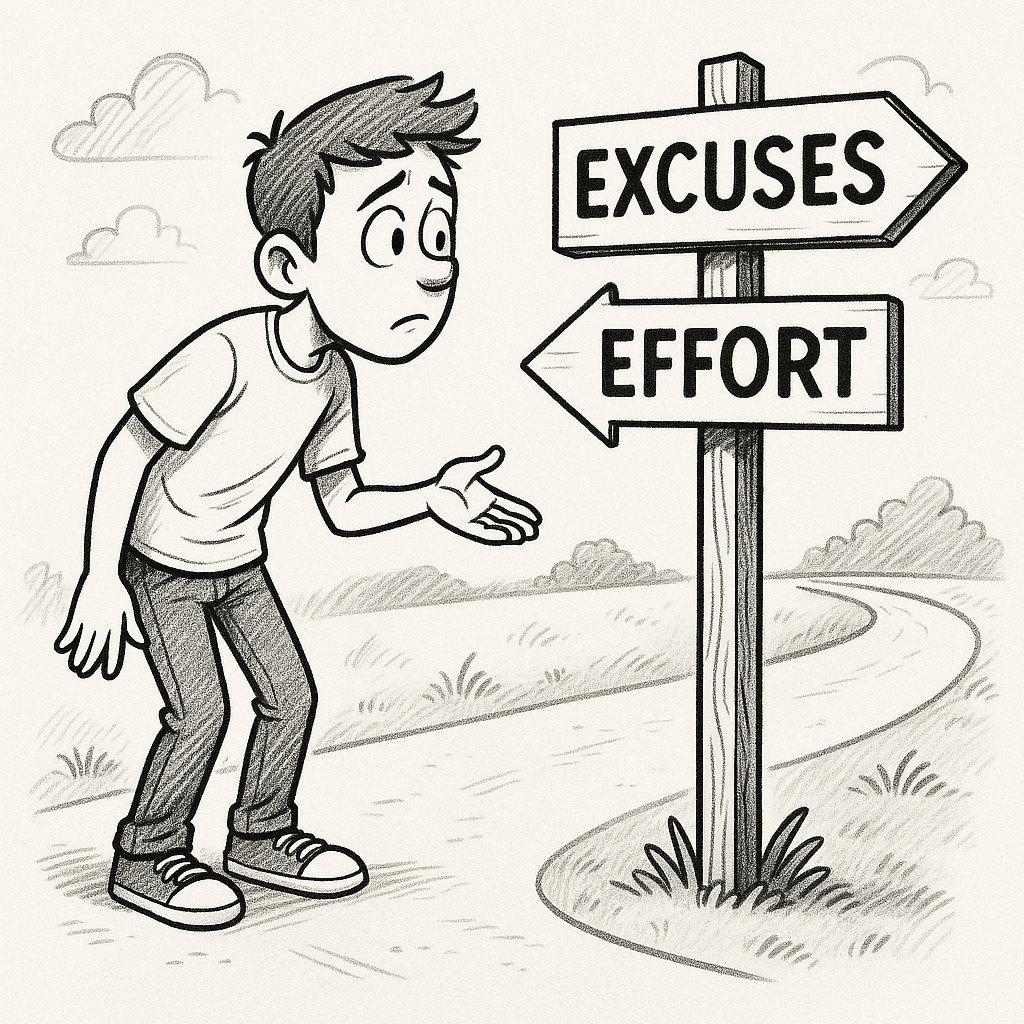Ever blamed traffic for being late instead of admitting you overslept? This common behavior is part of the self-handicapping mental model.
It’s a pattern where people create excuses or obstacles to avoid taking full responsibility for potential failure. It’s like building a safety net for your ego, but one that often backfires.
Imagine staying up late scrolling through content before a big presentation. If you perform poorly, you can blame tiredness instead of your skills. This strategy temporarily shields confidence but quietly erodes growth. Why? Because dodging accountability stops us from learning and improving our performance.
Small actions count too. Skipping practice before a game or “forgetting” to prepare for a meeting are subtle self-handicapping behaviors that protect their self-image. These choices might feel harmless, but over time, they limit success and hinder goal achievement.
Sound familiar? You’re not alone—many use these strategies without realizing their long-term effects on their behaviors and overall performance.
Key Takeaways
- The self-handicapping mental model is a way to avoid blaming yourself for failure.
- Common examples include procrastination or creating excuses.
- It provides short-term relief but harms long-term growth.
- Even small habits can become self-sabotage over time.
- This article will show how to spot and replace these patterns.
Introduction to Self-Handicapping

Have you ever claimed exhaustion after skipping preparation for a work project? This behavior isn’t laziness—it’s a protective strategy many use to dodge personal blame. When people create avoidable hurdles before a challenge, they’re setting up external excuses for potential failure. Think of it as wearing ankle weights in a race: if you lose, you can blame the weights instead of your speed.
Self-Handicapping Mental Model Patterns
Research shows students often use this tactic. A college athlete might party all week before a big game. If they perform poorly, they’ll blame fatigue rather than skill gaps. Professionals do this too—like overloading schedules before key presentations. These actions temporarily protect confidence but block honest feedback that fuels growth.
Why It Matters for You
Every avoided task or invented excuse chips away at long-term success. Imagine blaming “bad luck” for a missed promotion instead of addressing skill gaps. Over time, this pattern erodes self-trust and limits achievements. Understanding these habits helps break cycles—like using mental frameworks to spot hidden excuses.
Ready to ask yourself: “When did I last prioritize comfort over growth?” The answer could reshape your approach to challenges.
Origins and Research in Self-Handicapping

Ever heard someone blame a headache for a bad test score? This behavior has roots in groundbreaking studies from the 1970s. Researchers wanted to understand why people set themselves up to fail—and what excuses they’d create to protect their pride.
Historical Background and Key Studies
In 1978, Edward Jones and Stephen Berglas ran a revealing experiment. Students took a test filled with impossible questions. Afterward, they could pick a pill labeled as either performance-boosting or focus-draining. Most who struggled chose the “impairing” drug—a ready-made excuse for potential failure.
This study showed how people use external factors to shield their self-image. The setup mimicked real-life scenarios: facing tough tasks without clear solutions. Participants preferred blaming the drug rather than their abilities.
Insights from Edward Jones and Stephen Berglas
Jones and Berglas discovered this pattern wasn’t random. People often create obstacles when they doubt their skills. For example, a student might party before exams to later blame fatigue instead of effort. These findings still shape how we view excuses today.
Their work revealed a key truth: protecting ego often trumps genuine growth. When have you chosen comfort over facing a challenge head-on? Does this remind you of times you’ve blamed external factors?
Behavioral vs Claimed Self-Handicapping

Ever canceled plans last-minute because you felt “sick”? That’s one way people protect their confidence. Self-handicapping behaviors come in two flavors: actions we take and stories we tell. Let’s unpack both.
Self-Handicaps: Procrastination and Overcommitment
Imagine a student delaying study sessions until midnight before finals. If they fail, they’ll blame fatigue—not effort. This is behavioral self-handicapping. Real-life examples include:
- Overloading your schedule before a big project
- Skipping practice before a job interview
These behaviors create built-in excuses that can undermine your chances of achieving your academic goal. Researchers even found people might take a “focus-draining” drug in studies to explain poor performance, highlighting the negative effects of such choices.
Claimed Self-Handicaps: Excuses and External Blame
Now picture someone blaming allergies for a bad presentation. No real obstacle existed—they invented a reason afterward. Common claimed excuses:
- “My computer crashed” for missed deadlines
- “The instructions weren’t clear” for errors
While these behaviors feel protective short-term, they erode trust. Colleagues notice when excuses pile up. Do you sometimes find yourself making explanations instead of improvements?
Breaking these patterns starts with awareness. Need help spotting your blind spots? Reach out for practical strategies tailored to your habits.
Self-Handicapping Mental Model Impact

Did you ever skip studying and blame the teacher for a bad grade? This pattern creates real-world ripple effects. Research shows people who rely on excuses face lower success rates in school, work, and friendships.
Academic and Professional Consequences
A University of Texas study tracked 400 students over two years. Those who regularly used excuses had GPAs 12% lower than peers. Why? Skipping study sessions or blaming “unfair tests” creates a cycle. Each avoided effort reduces skills, leading to more failure.
| Behavior | Short-Term Effect | Long-Term Impact |
|---|---|---|
| Last-minute cramming | Blame tiredness | Lower retention |
| Blaming coworkers | Avoid criticism | Missed promotions |
| Skipping practice | Protect ego | Stalled skill growth |
Social Relationships and Self-Esteem
Friends and partners notice repeated excuses. A 2021 Journal of Psychology study found 68% of people distrust frequent excuse-makers.
Over time, this erodes connections and contributes to feelings of failure. How many friendships could survive constant “bad luck” stories?
Internally, the effects cut deeper. Each excuse whispers: “You couldn’t have succeeded anyway.” This damages self-trust and undermines your goal of personal growth.
One high school teacher shared: “Students who blame others stop raising hands. They fear being exposed as incapable.”
Breaking this cycle starts with honesty. Next time you face a challenge, ask: “Am I setting myself up to learn—or to have an out?”
Your answer could change your trajectory!
Role of Procrastination and Overcommitment

How many times have you scrolled through your phone instead of starting that important task? Delaying action often feels harmless, but it’s a sneaky form of self-sabotage. Let’s explore how procrastination and taking on too much quietly undermine success.
Common Signs: Procrastination Trap
Putting off tasks creates a cycle of stress and rushed work. Imagine a student delaying a research paper until 2 AM. They might finish, but the quality suffers. Common red flags include:
- Choosing easy tasks over priority work
- Saying “I work better under pressure” repeatedly
- Feeling paralyzed by anxiety about starting
Research shows 80% of college students admit to last-minute work. Why? Fear of imperfection often drives delays. Does this remind you of your work habits?
| Behavior | Immediate Effect | Long-Term Impact |
|---|---|---|
| Last-minute work | Temporary relief | Lower grades/scores |
| Avoiding practice | Less pressure | Stalled skill growth |
| Endless planning | Feels productive | Missed deadlines |
Overcommitment
Saying “yes” to everything spreads you thin. A graphic designer taking five projects at once might deliver rushed work.
Signs you’re overcommitted include the negative effects on your overall performance:
- Constantly rescheduling meetings
- Forgetting project details
- Feeling exhausted before starting
High school students juggling clubs and AP classes often face this. Prioritizing tasks and setting boundaries helps in achieving your goals.
Try writing three daily priorities—crossing them off builds real confidence and allows for a better analysis of your performance and potential failure.
Self-Handicapping Strategies and Insights

Ever told yourself you’re “just not a math person” before a tough exam? Breaking free from limiting patterns starts with smart strategies that build confidence. Let’s explore research-backed methods to replace excuses with action.
Developing a Growth Mindset and Self-Efficacy
A Stanford study found students who viewed challenges as skill-building opportunities improved test scores by 17%. Try these steps:
- Start small: Tackle a 10-minute task daily to build momentum
- Reframe setbacks: Instead of “I failed,” ask “What can I adjust?”
| Strategy | Action Step | Outcome |
|---|---|---|
| Break goals | Divide projects into 3 steps | Reduces overwhelm |
| Track progress | Use a simple checklist | Builds visible wins |
| Seek feedback | Ask one colleague weekly | Identifies blind spots |
Self-Compassion and Practical Interventions
University of Texas research shows self-kindness boosts resilience by 42%. Try this 2-minute daily check-in strategy to analyze your goals:
- Name one challenge you faced
- State how you’d comfort a friend
- Apply that kindness to yourself
A high school teacher shared how this method helped a student overcome test anxiety and analyze the effects of failure. Instead of blaming “bad luck,” they analyzed obstacles and created study playlists to enhance their performance and focus better.
What’s one tiny goal you could tackle this week? Whether it’s preparing lunch the night before or practicing deep breaths, small wins create lasting change. Progress beats perfection every time.
Psychological Underpinnings and Emotional Roots

Ever felt unprepared but blamed it on “not having the right tools”? This reflex often grows from deeper emotional soil. Let’s dig into why we sometimes choose excuses over effort—and how past experiences shape these choices.
Fear of Failure and Imposter Syndrome
That voice whispering “You’ll embarrass yourself” isn’t laziness—it’s fear wearing disguise. A 2022 Yale study found 65% of professionals delay tasks due to doubting their abilities. Picture a baker refusing to try new recipes, fearing criticism. Each avoided attempt becomes a missed chance to grow.
| Emotional Root | Common Behavior | Long-Term Cost |
|---|---|---|
| Fear of judgment | Avoiding new projects | Stagnant skills |
| Imposter syndrome | Over-explaining successes | Burnout risk |
| Perfectionism | Endless revisions | Missed deadlines |
Impact of Childhood Trauma and Emotional Neglect
Early experiences plant seeds for future obstacles. Children praised only for perfect grades might grow into adults terrified of mistakes. Research shows people with critical parents are 3x more likely to use excuses in adulthood. One teacher shared: “Students who fear home reactions often blame ‘forgetting’ homework instead of asking for help.”
Breaking these patterns starts with kindness. Ask yourself: “When did I first feel afraid to try?” Recognizing these roots helps replace old strategies with healthier habits and effective strategies that align with your goals.
Small steps—like sharing draft work with a friend—build confidence that outshines fear and enhances your overall performance.
Conclusion
The self-handicapping mental model is nothing more than inventing reasons for setbacks instead of facing challenges head-on.
Decades of research reveal a pattern: creating protective excuses might soften failure’s sting temporarily, but it steals opportunities to grow.
Whether it’s blaming a busy schedule for missed goals or claiming “bad luck” in relationships, these behaviors quietly limit our potential and increase the costs of inaction.
Studies show students who rely on excuses earn lower grades, while professionals risk stalled careers. The effects ripple beyond performance—repeated justifications erode trust in friendships and self-confidence.
analysis of these strategies reveals that blaming caffeine crashes for work errors instead of improving time management skills can hinder overall performance.
The good news? Change starts with small steps. Set one clear goal this week, like preparing notes before meetings or asking for feedback after projects. Track progress with a simple checklist—each checkmark builds real confidence.
As one teacher observed: “Students who replace ‘I can’t’ with ‘I’ll try’ often surprise themselves.” Joining a group focused on similar strategies can also enhance motivation.
What strategy will you test first? Whether it’s breaking tasks into smaller steps or celebrating effort over perfection, progress beats excuses every time. Your future self will thank you for choosing growth over comfort.


